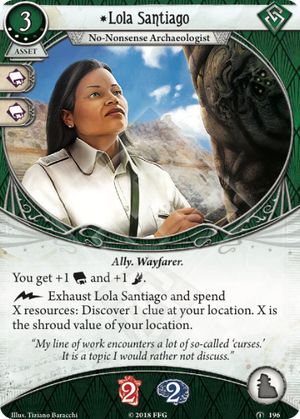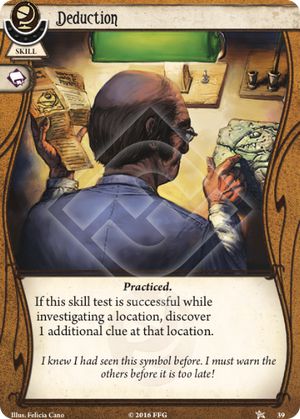
At what time during setup do you set aside the Insight events? Presumably before drawing your opening hand. (Ah never mind the rest of my comments. I now see that the deck size s 40 so that his regular deck matches normal investigators deck sizes).

At what time during setup do you set aside the Insight events? Presumably before drawing your opening hand. (Ah never mind the rest of my comments. I now see that the deck size s 40 so that his regular deck matches normal investigators deck sizes).

Lola Santiago is incredibly powerful in a Preston Fairmont deck. I’d say she’s an auto-include.
With Preston’s Family Inheritance Lola lets Preston discover one clue per turn on a shroud 4 or lower (5 or lower if he’s a Lonewolf...) without taxing his resource pool.
In solo, where many locations are single clue locations, this lets Preston solidly hoover up clues while tooling up / drawing cards / moving around the map with his three actions.
Lola is better than Leo in a Preston solo deck. She also gives you a free action a turn, albeit limited to investigating, but that action is test-less, and one you’ll often want to do every turn anyway.
Finally, how does she compare to Streetwise? Sure, streetwise is far more flexible, as it lets Preston boost either Intellect or Agility to 7 once a turn by spending all of his Family Inheritance. Lola boosts those stats too, albeit only to 2, but at least it’s a permanent boost. I’d rather be investigating testlessly than pumping my Intellect via Streetwise and still risking drawing an Autofail.
Streetwise’s main strength is that it’s permanent, so you really have to buy it first. But once you have I’d save up your next 6XP for two copies of Lola
Especially when you add in her damage / horror soak which effectively puts Preston up to 8 in both.

Lola Santiago is incredibly powerful in a Preston Fairmont deck. I’d say she’s an auto-include.
With Preston’s Family Inheritance Lola lets Preston discover one clue per turn on a shroud 4 or lower (5 or lower if he’s a Lonewolf...) without taxing his resource pool.
In solo, where many locations are single clue locations, this lets Preston solidly hoover up clues while tooling up / drawing cards / moving around the map with his three actions.
Lola is better than Leo in a Preston solo deck. She also gives you a free action a turn, albeit limited to investigating, but that action is test-less, and one you’ll often want to do every turn anyway.
Finally, how does she compare to Streetwise? Sure, streetwise is far more flexible, as it lets Preston boost either Intellect or Agility to 7 once a turn by spending all of his Family Inheritance. Lola boosts those stats too, albeit only to 2, but at least it’s a permanent boost. I’d rather be investigating testlessly than pumping my Intellect via Streetwise and still risking drawing an Autofail.
Streetwise’s main strength is that it’s permanent, so you really have to buy it first. But once you have I’d save up your next 6XP for two copies of Lola
Especially when you add in her damage / horror soak which effectively puts Preston up to 8 in both.

This bad boy doesn't have a review? Well lets remedy that!
This is one of those skill cards that tick the boxes for good skill cards. "This skill card gives a numerical bonus on a test and":
Generally cards that don't tick the boxes above tend not to be quite as good as the rest. For example the reason many many decks choose Guts is because it has a high change at "healing" damage or horror, as well as gaining you a card.
Deduction ticks the former box, "Furthers board state". You gain 2 clues from a location for 1 action, taking you 1 step closer to the endgoal, not to mention that it helps you get the original clue with it's +1. Action compression is one of the most useful mechanics a card can grant, Deduction does this all for free, making it one of the best skills in the game and a go-to card to fill out the deck of anybody who can bring it in-faction, whether you're Joe Diamond or Daisy Walker.
Note that the card is a drastically weaker pick in solo, due to the prevalence of single clue locations, but in this case it is still a great card as a means to finish 2-clue spots more easily, especially if its a big 3+ shroud victory location, definitely still worth a slot..

Terrible. Why?
There are some combo mechanics, In the Know and Connect the Dots for example, still the benefit is extremely limited in scope. The levelup version Barricade is vastly better but again the benefit is so transient that the XP commitment and card slot will just feel that much worse when you have this card in hand unable to leverage it into a useful gameplay benefit.
Personally I think the barricade should have resources on it, and resist so-and-so many attempts to move or spawn into a location, and allow the player to leave instead, but this is not so and thus this remains a terrible card to include in pretty much any deck.